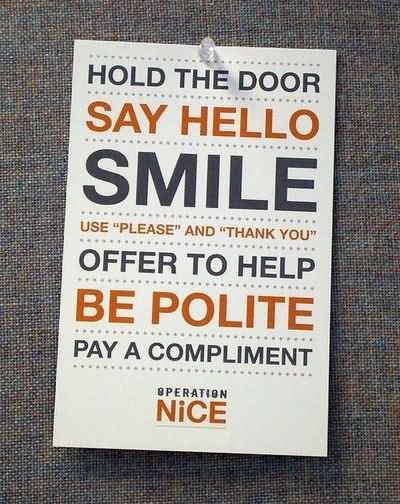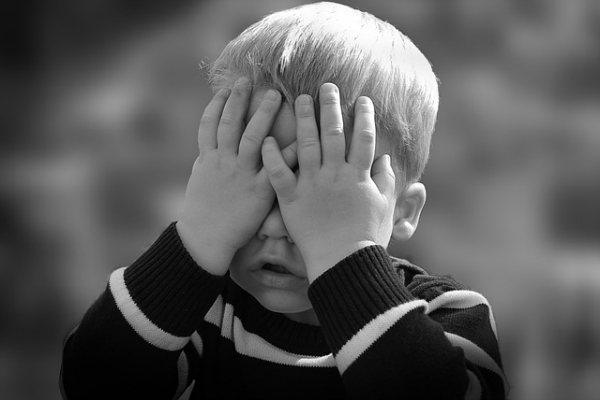When my six-year-old was a baby, I was immersed for the first time in the fascinating new world of Other Parents. I had no friends with kids, so it was truly surprising to me when parents told their toddlers what to say by phrasing it in a question: “Can you say hi?” “Can you say thank you?” “Can you say pardon me, do you have any Grey Poupon?” “NO,” I thought. “Your kid can’t say thank you. He’s asleep with a binky is in his mouth.”
I vowed not to try so hard. My extreme wise-a**ery led me to mull it over with my husband. We were extremely wise together. (What happened to all that wisdom?!) “Our behavior will be a model for our young son. We geniuses will not need to speak for our offspring. He will live, and he will learn! We alone will conquer!” (Well, it was something like that.) Thus, I never made Noah say please or thank you when he was really young, never tried to make him say he was sorry, never took him back to the scene of an accidental run-into-someone situation and force him to excuse himself. We thought we were superior.
Fast-forward six years. I give my son’s playmate a cookie, and she says, “Thank you, Miss Megan.” Someone gives my son a cookie, and he takes it and growls at them. Now, before you question my wise-itude, I’d just like to say that my daughter—aged three—says please, thank you, sorry, excuse me, and asks us to pass the Grey Poupon at dinner. For the most part, we parented her the same way we parented our son. It would seem that while she DID pick up on social cues without our explicit help, our son did not. For whatever reason, the combination of his personality and our lackadaisical attitude toward manners at his impressionable young age resulted in one seriously stubborn, often rude little guy. So now we’re seriously back-pedaling, and while you ask your toddler to say “Goodnight and thank you for having me at your lovely home, Miss Megan,” I’m asking my six-year-old to say, “Yes, please,” instead of glowering in silence when the barista asks if he’d like a free hot chocolate.

In all seriousness, my son’s personality is challenging, as I’ve written before. He’s sensitive, introverted, often shy, and he embarasses extremely easily. His insecurity comes out as aggression, so if he doesn’t know you, and you say hi to him, you’re most likely to get a snarl or an eye roll in return. If he DOES know you, there’s a 75 percent chance you’ll get the same treatment. His attitude is hard for me, as someone who loves people and considers myself kind and friendly most of the time. I have to fight the feeling that his bad manners reflect poorly on me as his mother.
So what can I do besides remind him, as parents remind younger children, that manners are important? For someone like my son, this has to be explained—in detail. “WHY does it matter if I say hello?” he asks me every time we have this conversation (which is—on average—at least twice a day). “WHY do I have to say thank you?” He genuinely doesn’t get this social construct: why is it considered being polite to others to talk when you don’t feel like it? In my attempt to explain, I go into my (by-now memorized) little speech: “Webster’s defines manners as a way of behaving toward others. Your behavior toward other people matters because you can affect how they feel after their encounter with you. If you are rude, they might feel badly and go on to be rude to someone else. If you are kind, they will feel glad to have been around you and will hopefully treat others with kindness as well. Plus, if you’re nice to people they will want to be around you!” (I had him until that last statement. Having people want to be around him is not a treat for him.)
The truth is that I really have no idea what I’m talking about. I have a hard time because I (like my three-year-old) don’t need it explained. I don’t care why it works; I just understand that it does. This is the way we treat people. End of story. But for my son, I have to formulate some kind of answer, and some variation of the above is usually what I end up saying. I am, yet again, exasperated in the car on the way home from some negative exchange. Manners don’t come easily to him because social interaction doesn’t come easily to him. I worry that he will grow up without basic social skills and will become a lonely soul, so I keep trying to hammer these elementary social rules into his head.
I’m in fake-it-till-you-make-it mode—similar, I now understand, to parents asking their crawling babies to go back and say sorry to the person they just tripped. “You don’t have to be chatty,” I remind him desperately. “If you don’t want to make small talk, you don’t have to. But you have to say hello, you have to say goodbye, and you have to say thank you. Okay? Can you do that?! Just do it for me. Please?!!” He grumbles and rolls his eyes. “Alright,” he mutters darkly.
It’s beginning to stick, but it’s such a painfully slow process. Just this weekend, we ran into one of my girlfriends, and I stopped to talk to her. She said hello to Noah, and in response, he groaned and hid behind my legs. Yesterday, we left a friend’s house and (in his typical fashion) he opened up the front door and began to leave without saying goodbye to anyone. I caught him and reminded him to say goodbye and thank you to our friends. So (after an eye roll—which he is totally perfecting by the way), he turned around and yelled “FINE! BYE! BYE!!” to the house at large. Then he tore out of there before I could catch him by the coat. Obviously, we still have some work to do.
There are, however, glowing moments of hope too. On New Year’s Eve, we went to the Family Wash with some friends. A police officer was in there getting some coffee and passed out little stickers that looked like police badges to all the kids. I was too far away from my grumpy son to remind him to say thank you (or at the very least to try to prevent a roar), and this cop was my son’s worst nightmare—a friendly authority figure. To my utmost surprise, however, he took the sticker gently, looked into the officer’s eyes, and said, “thank you.” He even managed a small smile. Victory!
At the risk of WAY over-thinking it, I can’t help but wonder if all my speeches about manners might really be true. If our son had been rude to that friendly police officer, maybe he would have felt kind of let down. After all, he probably felt a little bit like a hero giving out stickers to kids. You know, like maybe he was Batman giving a poor kid one of his bat darts, and the kid’s all like “Whoa! You’re Batman! Gee whiz!” Or whatever. Anyway, the point is, my son’s sour attitude might honestly have made that cop feel bad, and I think we can all agree cops in good moods are a good thing.
Maybe we can even agree that everyone in good moods is a good thing. At least, that’s what I’m trying to get Noah to understand. We have a long way to go… I’m sure teaching him to stand up on the bus so someone with crutches can sit down or even just getting him to USE A FORK will be an excruciating process. Right now, though, we’re just trying to manage the basics. Hello. Goodbye. Thank you. Why? Because manners matter. They just do. End of story.

















Wow! What an interesting experience! Nice work mama taking time to understand where he’s coming from while you still try to guide him in areas that you think will be valuable to him in the long run. Manners are hard! I think at least! But it sounds like you’re working really hard to help him gain some tools for his tool box as he grows up to face all types of different situations and circumstances. Seriously nice work and thanks for sharing so candidly.
We try to keep it simple with ours and explain, simply, that he is more likely to get what he wants if he says,’ please’ and more likely to get it again if he says,’ thank you’.
I totally don’t understand the mindset that young kids don’t need to be “taught” manners. They have to learn practically everything and social interaction is maybe THE most abstract and complicated. You don’t just put your kid on the ground and never touch them and expect them to walk after a year, right? With the intricacies of even defining what is socially appropriate and the startling number of adults who lack basic manners, I think it would be obvious even to pre-parents that it is not something that comes naturally or easy.
I was looking into gymnastics for my 3 year old twins and saw a place that prided themselves on the ideology that kids don’t need to learn to take turns or stand in line, but that is so a–backward it almost makes me mad. Kids learn behavior from a VERY young age, and if you are not teaching them to be considerate and mindful, you are teaching them to be selfish and inconsiderate. It only allows them to form habits and behaviors that need to be unlearned later, in conjunction with learning appropriate ones.
You have to teach children language anyway. If they grunt and point and you hand them the object and they grunt the next time, how could it not click that you are TEACHING them to grunt to get what they want? You are TEACHING that rude behavior is acceptable any time you give them what they want when they communicate their needs in a rude way. We are responsible for providing the words and phrases to help kids both understand their wants and needs and to communicate them back to us. Why not teach them polite language if you have to go through that process anyway?